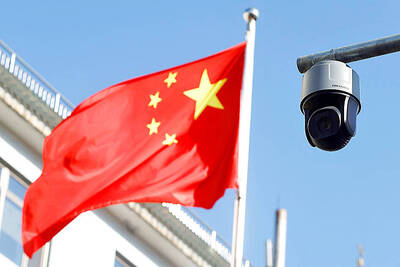The legislature’s Social Welfare and Environmental Hygiene Committee yesterday approved a series of draft amendments to the HIV Infection Control and Patient Rights Protection Act (人類免疫缺乏病毒傳染防治及感染者權益保障條例), aiming to put an end to controversial regulations that deport foreign nationals who have contracted the virus.
Under the current law, foreigners who have been in Taiwan for more than three months are required to be tested for HIV/AIDS and those whose results are positive for the sexually transmitted disease are to be deported.
Only three types of people are allowed to file an appeal to return within six months of their deportation: Those who were infected by spouses who are Taiwanese nationals; those who contracted HIV while receiving medical care in Taiwan; and those with relatives within two degrees of kinship who have household registration and currently reside in Taiwan.
If the amendments pass their second and third readings, Taiwan would be eligible to be removed from UNAIDS’ list of 18 countries that, as of August last year, deport HIV-positive individuals.
Centers for Disease Control (CDC) Deputy Director-General Chuang Jen-hsiang (莊人祥) said that since 2007, only 48 foreigners with HIV/AIDS have been permitted to return to the country following successful appeals, and that there are less than 20 HIV-infected foreign nationals currently awaiting deportation.
“Nevertheless, that does not change our HIV prevention protocols, which require medical institutions to report any person found infected with the virus before the centers step in to determine the source of infection and offer necessary medical information,” Chuang said.
The amendments also include a policy that entitles medical personnel, police officers and firefighters to forcibly subject individuals to HIV screening if they have been involved in an accident that could have exposed them to the virus, such as needlestick injuries or cuts from surgical instruments.
Medical practitioners are also allowed to order HIV test on unconscious patients without their consent and on newborns without their mother’s consent if the situation is deemed “medically urgent.”
In addition, starting in 2017, the cost of drug treatments for HIV/AIDS patients who have been receiving medications for two years or longer would be covered by the National Health Insurance (NHI) program rather than the CDC, should the amendments clear the legislative floor.
“Currently, all the medical costs of HIV patients, which are so substantial that the CDC has been left in the red every year and has run up NT$6 billion [NT$188.37 million] in debt to the NHI Administration, are shouldered by the centers,” Chuang said.
Chuang said that the change would not greatly impact patients, who would continue to pay the NT$200 minimum cost of a hospital visit.
Persons with HIV/AIDS Rights Advocacy Association of Taiwan secretary-general Ivory Lin (林宜慧) lauded the preliminary passage of the draft amendments.
“The enforced deportation of HIV-infected foreigners has been in place since the government introduced its first law on AIDS in 1990. We have waited nearly 25 years to see changes happen,” Lin said.

POLAM KOPITIAM CASE: Of the two people still in hospital, one has undergone a liver transplant and is improving, while the other is being evaluated for a liver transplant A fourth person has died from bongkrek acid poisoning linked to the Polam Kopitiam (寶林茶室) restaurant in Taipei’s Far Eastern Sogo Xinyi A13 Department Store, the Ministry of Health and Welfare said yesterday, as two other people remain seriously ill in hospital. The first death was reported on March 24. The man had been 39 years old and had eaten at the restaurant on March 22. As more cases of suspected food poisoning involving people who had eaten at the restaurant were reported by hospitals on March 26, the ministry and the Taipei Department of Health launched an investigation. The Food and

The long-awaited Taichung aquarium is expected to open next year after more than a decade of development. The building in Cingshui District (清水) is to feature a large ocean aquarium on the first floor, coral display area on the second floor, a jellyfish tank and Dajia River (大甲溪) basin display on the third, a river estuary display and restaurant on the fourth, and a cafe and garden on the fifth. As it is near Wuci Fishing Port (梧棲漁港), many are expecting the opening of the aquarium to bring more tourism to the harbor. Speaking at the city council on Monday, Taichung City Councilor

A fourth person has died in a food poisoning outbreak linked to the Xinyi (信義) branch of Malaysian restaurant chain Polam Kopitiam (寶林茶室) in Taipei, Deputy Minister of Health and Welfare Victor Wang (王必勝) said on Monday. It was the second fatality in three days, after another was announced on Saturday. The 40-year-old woman experienced multiple organ failure in the early hours on Monday, and the family decided not to undergo emergency resuscitation, Wang said. She initially showed signs of improvement after seeking medical treatment for nausea, vomiting and diarrhea, but her condition worsened due to an infection, he said. Two others who

Taiwanese should be mindful when visiting China, as Beijing in July is likely to tighten the implementation of policies on national security following the introduction of two regulations, a researcher said on Saturday. China on Friday unveiled the regulations governing the law enforcement and judicial activities of national security agencies. They would help crack down on “illegal” and “criminal” activities that Beijing considers to be endangering national security, according to reports by China’s state media. The definition of what constitutes a national security threat in China is vague, Taiwan Thinktank researcher Wu Se-chih (吳瑟致) said. The two procedural regulations are to provide Chinese